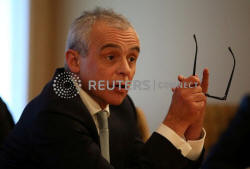Dollar funding and liquidity squeezes big risks for
2020, says Amundi CIO
 Send a link to a friend
Send a link to a friend
 [November 04, 2019] By
Sujata Rao [November 04, 2019] By
Sujata Rao
LONDON (Reuters) - Market liquidity as well
as dollar funding problems are likely to be the twin challenges for 2020
and Europe's largest asset manager Amundi had built up contingencies for
both, chief investment officer Pascal Blanque said.
Blanque, who oversees 1.4 trillion euros ($1.56 trillion) worth of
assets, told the Reuters Global Investment Outlook Summit that while the
China-U.S. trade war was unlikely to tip the world economy into
recession, one consequence was that "the dollar liquidity that
lubricates the system is challenged".
That comes on top of worries that stringent regulations introduced after
the 2008 crisis have eroded liquidity -- essentially how easy or hard it
is to convert securities into cash. The issue shot into the spotlight
this year when exposure to illiquid assets forced asset manager Woodford
to first freeze, than close an equity income fund.

"We've been building up liquidity buffers in the portfolio because we do
think liquidity management will be key in this phase of the cycle. It
will become obvious to markets that there is a tradeoff between
risk/return and liquidity," Blanque said, speaking via videolink from
Paris.
Markets also got a scare in mid-September when overnight U.S. repo rates
spiked to 10% - five times the fed funds rate at the time -- sending
banks scrabbling for cash and forcing the New York Federal Reserve to
pump money into markets for the first time in a decade.
It subsequently prompted the Fed to resume asset purchases.
"We are living in a paradox where there is excess liquidity on (central
bank) balance sheets but in terms of market liquidity we've got
frictions ... It's the non-observable part of the iceberg," Blanque
said.
He described the situation as a "turning point" because it is now
crucial that investment decisions take a view on liquidity -- within
portfolios as well as on markets.
Aside from building a toolbox to calibrate liquidity buffers for various
levels of market stress, Amundi has also been de-risking portfolios in
recent months, shaving equity exposure and favouring assets that are
less exposed to the trade slowdown such as in big emerging economies
such as Indonesia and India.
The dollar issue in particular raised the risk of sudden spikes in
liquidity and volatility, Blanque said, adding:
[to top of second column] |

Pascal Blanque, Group Chief Investment Officer of Amundi Asset
Management attends the Reuters Investment Summit, London, Britain,
November 16, 2017. REUTERS/Paul Hackett/File Photo

"I don't know when but we will face this kind of challenge and I feel well
prepared."
Despite the uncertainty, Blanque considers a global recession as unlikely. He
believes markets expect too much stimulus still to come from policymakers.
"There is a confusion between global growth and global trade. The retreat of
trade as a contributor to growth does not mean full blown recession," he said,
noting still-robust consumption and the effect of years of stimulus.
But this does signal more bond volatility, he said, adding; "The stellar
performance of defensives and bond proxies is probably behind us."
Blanque also said that for next year he favors:
* Positioning in high-quality and cyclical stocks in Europe
* The "resilience theme" -- consumer or telecoms sectors in developing countries
that are insulated from trade winds
* Some high-yielding emerging market currencies
* European banks: priced for the worst, the worst unlikely
* Reducing bias for being long credit; bond proxies too expensive

And expects:
* Global recession unlikely even if global trade shrinks
* Expects U.S. Fed to cut interest rate once more
* FX volatility could become part of landscape again; investors should rethink
hedging strategies
Follow Reuters Summits on Twitter @Reuters_Summits
(Additional reporting by Ritvik Carvalho; Editing by Alison Williams)
[© 2019 Thomson Reuters. All rights
reserved.] Copyright 2019 Reuters. All rights reserved. This material may not be published,
broadcast, rewritten or redistributed.
Thompson Reuters is solely responsible for this content. |